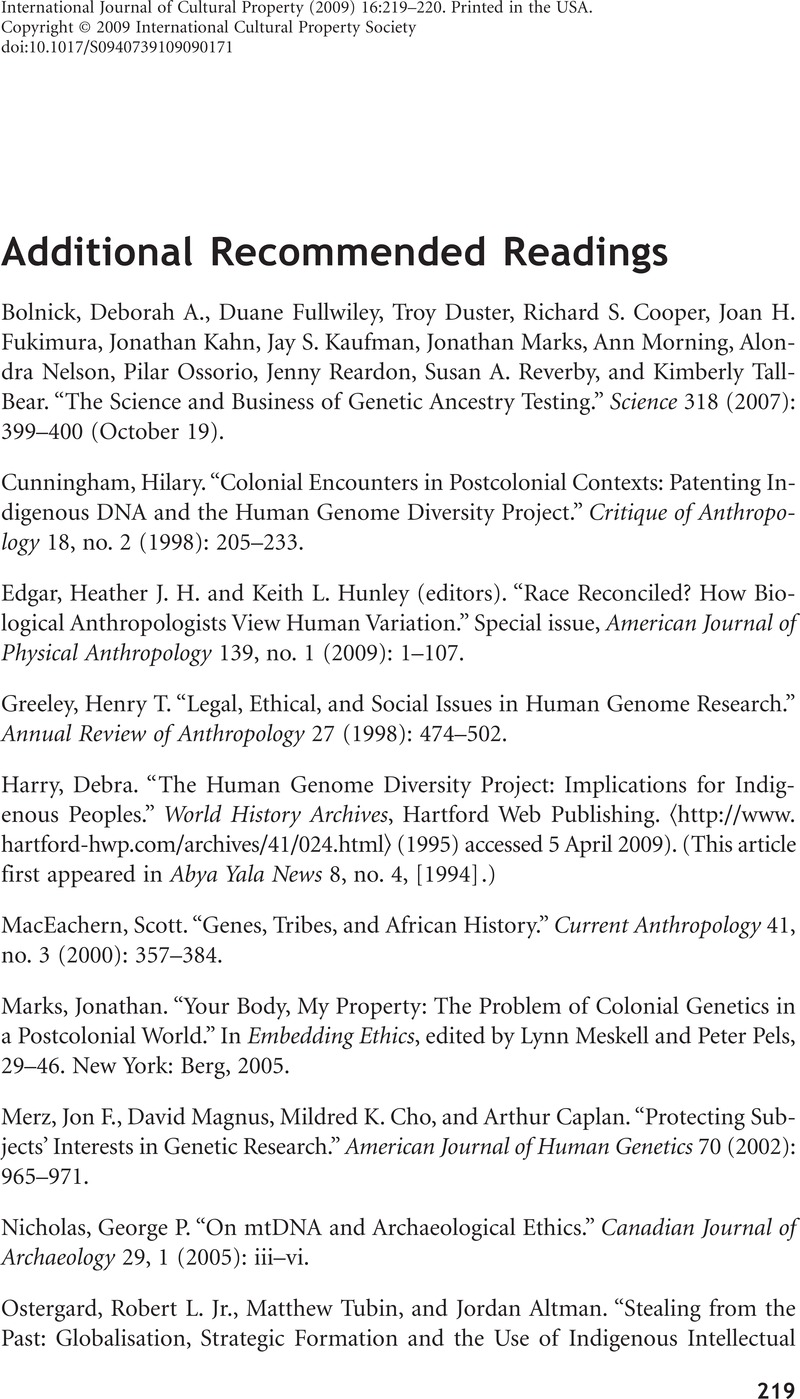No CrossRef data available.
Article contents
Additional Recommended Readings
Published online by Cambridge University Press: 30 July 2009
Abstract
An abstract is not available for this content so a preview has been provided. Please use the Get access link above for information on how to access this content.

- Type
- Other
- Information
- Copyright
- Copyright © International Cultural Property Society 2009
References
Bolnick, Deborah A., Fullwiley, Duane, Duster, Troy, Cooper, Richard S., Fukimura, Joan H., Kahn, Jonathan, Kaufman, Jay S., Marks, Jonathan, Morning, Ann, Nelson, Alondra, Ossorio, Pilar, Reardon, Jenny, Reverby, Susan A., and TallBear, Kimberly. “The Science and Business of Genetic Ancestry Testing.” Science 318 (2007): 399–400(October 19).CrossRefGoogle ScholarPubMed
Cunningham, Hilary. “Colonial Encounters in Postcolonial Contexts: Patenting Indigenous DNA and the Human Genome Diversity Project.” Critique of Anthropology 18, no. 2 (1998): 205–233.CrossRefGoogle Scholar
Edgar, Heather J. H., and Hunley, Keith L. (editors). “Race Reconciled? How Biological Anthropologists View Human Variation.” Special issue, American Journal of Physical Anthropology 139, no. 1 (2009): 1–107.CrossRefGoogle ScholarPubMed
Greeley, Henry T. “Legal, Ethical, and Social Issues in Human Genome Research.” Annual Review of Anthropology 27 (1998): 474–502.Google Scholar
Harry, Debra. “The Human Genome Diversity Project: Implications for Indigenous Peoples.” World History Archives, Hartford Web Publishing. ⟨http://www.hartford-hwp.com/archives/41/024.html⟩ (1995) accessed 5 April 2009). (This article first appeared in Abya Yala News 8, no. 4, [1994].)Google Scholar
MacEachern, Scott. “Genes, Tribes, and African History.” Current Anthropology 41, no. 3 (2000): 357–384.CrossRefGoogle ScholarPubMed
Marks, Jonathan. “Your Body, My Property: The Problem of Colonial Genetics in a Postcolonial World.” In Embedding Ethics, edited by Meskell, Lynn and Pels, Peter, 29–46. New York: Berg, 2005.Google Scholar
Merz, Jon F., Magnus, David, Cho, Mildred K., and Caplan, Arthur. “Protecting Subjects' Interests in Genetic Research.” American Journal of Human Genetics 70 (2002): 965–971.CrossRefGoogle Scholar
Nicholas, George P. “On mtDNA and Archaeological Ethics.” Canadian Journal of Archaeology 29, 1 (2005): iii–vi.Google Scholar
Ostergard, Robert L. Jr., Tubin, Matthew, and Altman, Jordan. “Stealing from the Past: Globalisation, Strategic Formation and the Use of Indigenous Intellectual Property in the Biotechnology Industry” Third World Quarterly 22, no. 4 (2001): 643–656.CrossRefGoogle Scholar
Richards, Chris. “Interview with Debra Harry and the Indigenous Peoples Council on Biocolonialism.” New Internationalist. ⟨http://www.findarticles.com/p/articles/mi_m0JQP/is_385/ai_n15970745⟩ (December 2005) accessed 6 April 2009.Google Scholar
Reddy, Deepa S. “Good Gifts for the Common Good: Blood and Bioethics in the Market of Genetic Research.” Cultural Anthropology 22, no. 3 (2007): 429–472.CrossRefGoogle ScholarPubMed
Resnik, David B. “The Human Genome: Common Resource but not Common Heritage.” In Ethics for Life Scientists, edited by Korthals, Michael and Bogers, Robert J., 197–210. Dordrecht, The Netherlands: Springer, 2005.CrossRefGoogle Scholar
Schroeder, Kari B., Malhi, Ripan S., and Smith, David G.. “Opinion: Demystifying Native American Genetic Opposition to Research.” Evolutionary Anthropology 15 (2006): 88–92.CrossRefGoogle Scholar
Sturges, Melissa L. “Who Should Hold Property Rights to the Human Genome? An Application of the Common Heritage of Humankind.” American University International Law Review 13, no. 1 (1997): 219–261.Google Scholar
Turner, Trudy R. (editor).Biological Anthropology and Ethics: From Repatriation to Genetic Identity. Albany: State University of New York Press, 2005.Google Scholar
Tsosie, Rebecca. “Cultural Challenges for Biotechnology: Native American Genetic Resources and the Concept of Cultural Harm.” Journal of Law, Medicine, and Ethics 35, no. 3 (2007): 396–411.CrossRefGoogle ScholarPubMed
“Who's Your Grand Daddy?” Marketplace, CBC News. ⟨http://www.cbc.ca/marketplace/whos_your_grand_daddy/⟩ (4 December 2007)
accessed 6 April 2009.Google Scholar
National Geographic's Human Genographic Project ⟨https://www3.nationalgeographic.com/genographic/⟩Google Scholar


